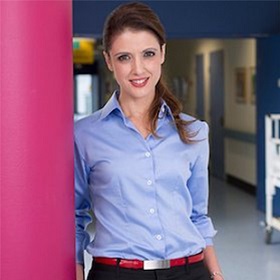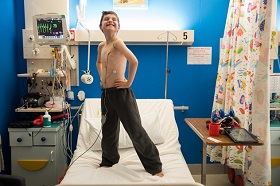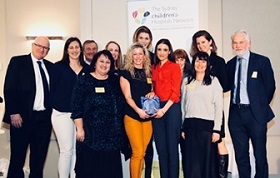Associate Professor Nadine Kasparian is a co-lead of the Children and Adolescent Wellbeing sub-theme of the UNSW Medicine Neuroscience, Mental Health and Addiction Theme and SPHERE Clinical Academic Group (CAG). She is Associate Professor in Medicine at UNSW Sydney and the Head of Medical Psychology at the Heart Centre for Children, Sydney Children’s Hospitals Network.
In the 2017 round of Neuroscience, Mental Health and Addiction Theme and CAG Collaborative Research Seed Funding, Associate Professor Kasparian was awarded $40,000 for her project: The Heart-Gut-Brain Axis: investigating the impact of serious medical illness in infancy on child and adolescent mental health, gut microbiota and stress hormone levels.

Name: Nadine Kasparian
Position/s: Associate Professor in Medicine at UNSW Sydney and Head of Medical Psychology at the Heart Centre for Children, Sydney Children’s Hospitals Network
Theme/CAG role: Children and Adolescent Wellbeing sub-theme co-lead
In 2017, you were a successful applicant in the Collaborative Research Seed Funding round for your project, The Heart-Gut-Brain Axis: investigating the impact of serious medical illness in infancy on child and adolescent mental health, gut microbiota and stress hormone levels. Can you please tell us about the project?
We’re thrilled to have received funding to kickstart this new project – nothing like this has been done in our field before!
To give a little background, congenital heart disease (CHD) is the most common birth anomaly, affecting 1 in 110 newborns globally and more than 2,400 Australian babies each year. It’s the most common cause of neonatal admission to paediatric intensive care, and one of the leading causes of disease‐related disability in young children.
There is now overwhelming evidence that children with complex CHD experience marked physical, emotional, behavioural and neurodevelopmental challenges. Cardiac diagnosis and treatment can have a profound influence on the developing infant, placing children at risk of outcomes similar to those associated with early life adversity. Our understanding of the mechanisms underlying these poorer outcomes is limited. For instance, we know little about the impact of CHD on other psychobiological systems and how these might relate to mental health outcomes. Understanding how and when to intervene to produce the best emotional and neurobiological outcomes are open questions in this vulnerable population.
Our project is examining the psychological and neurobiological impacts of heart disease during childhood and adolescence. We are collecting rich mental health and neurobiological data (using functional magnetic resonance imaging) from children and adolescents with complex CHD and coupling this with microbiome analysis to investigate the association between brain function and the microbiome in the context of serious medical illness.
Essentially, we are exploring the ways in which early medical adversity may get ‘under the skin’ to influence emotional health and wellbeing throughout childhood and beyond. And we can’t wait to share our findings with you very soon!
What impact do you imagine this project will have?
This project brings together an exciting new interdisciplinary team with expertise in child and adolescent psychology, paediatric cardiology and cardiac surgery, neuroscience, biostatistics and gastroenterology.
Our project will generate the first microbial evidence upon which new therapies targeting gastrointestinal health may be developed to support the care and recovery of children with heart disease, both during hospital admission and at home.
How early life experiences get ‘under the skin’ to change microbial function in ways that impact brain development, emotion learning and behaviour is important to understand, particularly for children who may have a heightened vulnerability to adversity. Understanding the mechanisms that influence emotional and neurobiological outcomes for children with serious medical illness - at the whole-body systems level - is critical to promoting and sustaining the health and wellbeing of this group.

Photo credit: Kimberley Low
How do you view your role as a sub-theme leader for Children and Adolescent Wellbeing?
Having an opportunity to work alongside sub-theme co-lead Professor Helen Christensen in this role is an absolute privilege. Our goal is to nurture new ideas, collaborations and talent to reduce the burden of mental illness in children and young people.
We have supported new studies focused on breaking the intergenerational impact of perinatal drug use and developing novel ways of identifying mental health disorders in children as early as possible. We have also established an exciting new ‘living lab’ initiative, putting young people at the centre of mental health research. And we will be announcing a series of new projects very soon!
How has the Neuroscience, Mental Health and Addiction Theme and CAG facilitated new opportunities in research and/or collaboration in your sub-theme?
It’s been wonderful to see new research collaborations form – especially partnerships between clinicians and academics bringing new ideas to life in ways that will have real impact.
For me, providing opportunities for our early career researchers has also been extremely important. In a competitive research environment, it’s vital we support new talent with seed funding that can kickstart grant success and (perhaps even more importantly) nurture a sense of confidence and self-belief for those entering the field. Opportunities like these can make a real difference to early career scientist-practitioners, setting in motion a body of work that can transform our way of thinking.
And on a personal level, it’s been a joy to meet so many new people and to be a small part of the discussions our group has had to improve care and support for children and young people who are vulnerable to mental illness.

Associate Professor Kasparian’s team received the 2018 Sydney Children’s Hospitals Network Quality and Innovation Award for Excellence in the Provision of Mental Health Services. The team is nominated for the same category in the NSW Health Awards. Congratulations!


